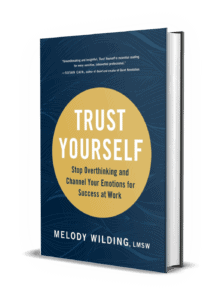A Sensitive Striver is a high-achiever who is also more sensitive to their emotions, the world, and the behavior of those around them.
Sensitive Strivers have a special set of genes that leads them to process information more deeply than their less sensitive peers. Because of this, they pick up on subtle changes in their environment.
Sensitive Strivers are driven to succeed and give their 100% to everything they do – all with an inner world on overdrive. Many are former gold-star students who bring that same commitment into the workplace.
I coined the term Sensitive Striver after a decade of researching and coaching top performers at companies like Google, Facebook, Netflix, Visa, Verizon, and many others. Through my work, I discovered that the intersection of high sensitivity and achievement leads to a particular set of challenges. Everything from struggles with imposter syndrome and confidence to difficulties setting boundaries, speaking up, and beyond.
If this resonates with you, then welcome. You’re in exactly the right place.
Your mix of qualities makes you who you are and likely has made you super successful. On the one hand, people appreciate your warmth, depth of personality, and overall conscientiousness. On the other hand, situations others find relatively easy, such as making decisions and recovering from setbacks, can send you into a downward spiral.
As a Sensitive Striver, you may sometimes feel demoralized by the high expectations you place on yourself, leading to overthinking minor situations. You may also be prone to emotional overwhelm that shows up in the form of tears, panic, or complete withdrawal.
That’s because when sensitivity and achievement meet, it can be a tricky combination. Being highly attuned to your emotions, your environment, and the behavior of others can be the key to success, but it can also lead to overthinking everything and burnout.
Because they are easily overwhelmed, Sensitive Strivers have a heightened stress response. Common workplace situations like getting feedback, giving a presentation, or even deciding what to eat for lunch are more challenging than those for less sensitive people.
While many Sensitive Strivers rise quickly in their careers, they often face a daily battle with stress and self-doubt and crave a sense of control and calm, like my client Kelly (name changed) did.
Story of a Sensitive Striver
Kelly’s job was killing her spirit.
When she originally started as social services director at a large county agency, she’d been excited to lead a team and take her career to the next level. The agency’s mission of serving underprivileged children fueled her. All her mentors said that she was perfectly positioned to quickly step into a VP role with her drive and ambition.
But, due to budget shortfalls and changes in management, Kelly’s team had been short-staffed for the past three years, which left Kelly to pick up the slack. In addition to her official job responsibilities, she was assigned to lead a major project. She filled in at board meetings and made decisions on behalf of her boss, an absentee manager.
At first, she didn’t mind. She loved her job and took pride in being the go-to person at the agency. Besides, good employees go above and beyond. Or at least that’s what she was taught and assumed she needed to do to be successful. Over time, the demands on Kelly’s energy and mind became too much. She logged 60+ hour weeks. Her hair began to fall out. She battled migraines daily.
Work also affected her home life. Kelly was always glued to her phone and answering emails, including during family dinners. She felt distracted and worried about issues at the office, even while playing with her young daughter.
Kelly knew she needed to say “no,” delegate, and stop taking so much on. But the thought of having that difficult conversation with her boss made her impossibly anxious. Her mind rushed to worst-case scenarios: What if her boss questioned her commitment? What if he fired her? She told herself to “work harder—you’re making a big deal out of nothing.”
Before long, Kelly’s exhaustion caught up with her to the point that she had to take a medical leave from her job. Although extreme and highly unpleasant, this experience was a profound wake-up call for Kelly, and she finally decided to seek help.
Kelly and I started working together as she returned to work after her medical leave. She told me she felt like she wasn’t in control of her own life anymore. She desperately wanted to rediscover a feeling of fulfillment and to seem more like herself again.
Burnout, like that Kelly faced, is common among Sensitive Strivers. They are so loyal to other people, and the path to success society has laid out that they blindly pursue more achievement without ever stopping to define what makes them happy. Many Sensitive Strivers in Kelly’s shoes have also never been taught to recognize how their sensitivity shapes their lives, and they lack a game plan to channel their ambition and drive in a way that emboldens, rather than drains them.
Free BOOK CHAPTER
Turn your sensitivity into a strength and regain your confidence at work
Get exclusive access to Chapter One of my book, Trust Yourself: Stop Overthinking and Channel Your Emotions for Success at Work.
By submitting this form you consent to receive newsletters and promotions via email. Unsubscribe or opt-out any time. See our Privacy Policy.
What Being a Sensitive Striver Is – and Is Not
Sensitive Striver might sound like just another way to describe a perfectionist, overachiever, or introvert. But those terms do not adequately describe the unique struggles Sensitive Strivers face.
For instance:
- You can be a perfectionist who has a low degree of self-awareness and not be highly accomplished in your career.
- You can also be an “overachiever” (defined as someone who performs better or achieves more success than expected) without feeling paralyzed by mistakes (perfectionism) or facing the higher-than-normal emotional reactivity that comes with being sensitive.
- About 30 percent of sensitive people are extroverted, meaning they gain energy by being around people.
So, Are You a Sensitive Striver?
If you relate to most of the statements below, then you may be a Sensitive Striver:
- You experience emotions to an unusual level of depth and complexity. You may cry easily from both sadness and happiness.
- You’ve been called “intense” or “too much” because of your relentless pursuit of achievement and desire to get better or do more.
- You’ve always had a keen ability to sense others’ feelings, needs, or insecurities, including those of parents and teachers, which may have resulted in people-pleasing versus considering your own needs.
- You struggle to “turn off” from work mode and it can feel like there are 100 tabs open in your brain at all times.
- You’re a stickler for details and organized to the nines, but can get too caught up in being meticulous. You may drive yourself (and those around you) crazy because you never feel like work is complete.
- You know intellectually that most feedback is no big deal, but one negative comment can leave you feeling terrible for days as you analyze and try to interpret the information.
- You’re deliberate and need time to think before you act. This means you excel at strategy and planning — that is, if you can move past second-guessing yourself and overthinking everything.
- You are conscientious and try to prepare for every eventuality. But if you’re caught off-guard in a meeting or conversation, you may get easily overstimulated and question how to respond.
- You’re able to sense conflict often before others are even aware of it, making you a master at empathetic communication. However, your constant vigilance can be emotionally and mentally draining.
How Being a Sensitive Striver Can Be a Strength
Thinking and feeling deeply isn’t a defect. You see, your sensitive qualities, when channeled productively, can be your career superpowers. The research proves it: managers consistently rate people with higher sensitivity as their top contributors. That’s because Sensitive Strivers are thoughtful, conscientious, empathetic, and dedicated – all of which make them ideal employees and leaders.
Kelly, the client whose story you read about earlier, reflected on the patterns she needed to change during her time off. She realized her actions—from people-pleasing to negative self-talk—were preventing her from pursuing opportunities that better fit her true nature and financial goals.
Through our work together she came to understand (and protect) her sensitivity, leverage it as a strength, and channel her ambition in healthier ways. She put into practice the same tools you’ll discover in my book, Trust Yourself: Stop Overthinking and Channel Your Emotions for Success at Work.
Kelly put into practice many tools from the book include quieting her inner dialogue, regulating her emotions, and learning how to speak up and push back against her challenging colleagues. Within a few months of returning to work, she received a promotion, was honored as a top manager at the company, and is now entertaining several new job offers from recruiters.
As Kelly’s story shows, once you better understand how your built-in sensitivities shape the way you see yourself and approach your career, you can channel your qualities as strengths and not self-sabotage. Instead of feeling ordered around by your insecurities, worries, or your own unrealistically high expectations of yourself, you can feel in control of your own life and reclaim what success means to you.
Get My Book: Trust Yourself

Groundbreaking and insightful, TRUST YOURSELF is essential reading for every sensitive, introverted professional. Wilding does a brilliant job of giving you tools to regain your confidence and become your most empowered self.
––Susan Cain, author of Quiet and creator of Quiet Revolution
Trust Yourself offers a neuroscience-based blueprint based on decades of research and client work to help you break free from stress, self-doubt, and perfectionism so you can regain your confidence at work and reclaim control of your life.
In Trust Yourself, discover how to:
- Achieve confidence and overcome imposter syndrome
- Find your voice to speak and act with assertiveness
- Build resilience and bounce back from setbacks
- Enjoy your success without sacrificing your well-being
If you’re an empathetic, driven person trying to navigate your career and learn how to believe in yourself in the process, Trust Yourself offers the mindset and tools to set you on the path to personal and professional fulfillment.
Check out the Ultimate Guide for Sensitive Strivers for free resources to outsmart imposter syndrome, stop second-guessing yourself, and much more.
Free BOOK CHAPTER
Turn your sensitivity into a strength and regain your confidence at work
Get exclusive access to Chapter One of my book, Trust Yourself: Stop Overthinking and Channel Your Emotions for Success at Work.
By submitting this form you consent to receive newsletters and promotions via email. Unsubscribe or opt-out any time. See our Privacy Policy.









